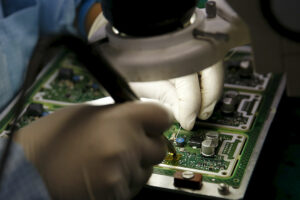Electronics industry says RCEP needed to ensure competitiveness

THE electronics industry expressed confidence in the industry’s competitiveness, but urged the Senate to ratify the Regional Comprehensive Economic Partnership (RCEP) trade agreement to enhance its prospects.
Danilo C. Lachica, president of Semiconductor and Electronics Industries in the Philippines Foundation, Inc., said during BusinessWorld Live on One News Channel that the trade deal is good for the electronics sector since the deal will make its exports competitive.
“RCEP is favorable to us because… we have top countries that compete (in supplying) electronics products. If we are not part of RCEP, then… compared to those countries who are participating in RCEP, our exports, with tariffs and everything, will be more expensive,” Mr. Lachica said.
Mr. Lachica added that the electronics industry’s competitive advantage lies in its work force.
“The biggest asset we have in the Philippines is the productivity of our labor. If we can just rationalize holidays and address that, then we will continue to be advantageous and competitive with labor,” Mr. Lachica said.
The RCEP, which started coming into force in various jurisdictions on Jan. 1, involves Australia, China, Japan, South Korea, New Zealand and the 10 members of the Association of Southeast Asian Nations (ASEAN). It is projected as the world’s largest trade deal, accounting for about 30% of global gross domestic product.
The Philippines has yet to finalize its participation in the trade deal after the Senate was unable to give its concurrence in the previous Congress due to concerns over the lack of safeguards for the agriculture sector.
Senate concurrence is needed before the country can deposit its instrument of ratification to the ASEAN Secretary General. President Ferdinand R. Marcos, Jr. also needs to endorse the trade deal to the Senate.
Mr. Lachica urged the government to review the rationalization of incentives under Republic Act No. 11534 or the Corporate Recovery and Tax Incentives for Enterprises (CREATE) Act, citing the need to compensate for the Philippines’ high operating costs.
“The thing is power and logistics are still big handicaps. We are hoping that the operating costs can be significantly reduced. That’s really the premise for requesting a review of the incentives because at least, we have something to offset the high operating cost to give the multinationals the rationale and the reason to locate in the Philippines,” Mr. Lachica said.
“We have observed about $3.2 billion of capital flight and we hope that the situation does not get worse. We are at a disadvantage compared to our ASEAN neighbors. They have more generous incentives,” he added. — Revin Mikhael D. Ochave




